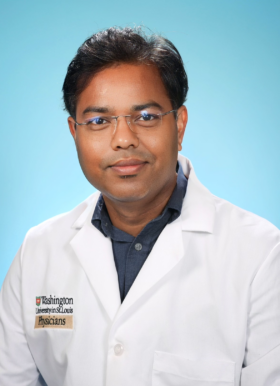
Chanchal Sur Chowdhury, PhD
Instructor, Pathology & Immunology
- Phone: 314-362-9103
- Email: chanchal@nospam.wustl.edu
Division
- Immunobiology
Education
- PhD, Cell Biology, University of Basel, Switzerland (February 2010 – April 2014)
- PhD, Exchange Research Personal, Boston Children’s Hospital, MA (June 2013 – November 2013)
- MSc Applied Microbiology, Periyar University, India (May 2007 – June 2009)
- BSc Microbiology, Genetics, Chemistry, Osmania University, India (June 2004 – July 2007)
Twitter Handle
Research Interests
- Infection
- Inflammation
- Immunology
- Translational research
Research Statement
Dr. Chowdhury, a distinguished researcher, is deeply committed to exploring the intricate facets of immune cells within a broad range of infectious and inflammatory diseases. His journey at Washington University’s Department of Molecular Microbiology began in 2019, where he collaborated closely with Professor Christina Stallings, resulting in a significant discovery. Together, they unveiled the crucial role of Neutrophil Extracellular Traps in promoting the pathogenesis of Mycobacterium tuberculosis. Dr. Chowdhury’s expertise also played a pivotal role in drug development projects focused on the application of NETosis inhibitors for tuberculosis treatment. As an Instructor within the Department of Pathology and Immunology, Dr. Chowdhury’s dedication is firmly directed towards unraveling the mechanisms governing immune and cancer cell death. He possesses a keen interest in investigating the role of cell death pathways in disease resolution and their profound impact on the immune landscape during both disease progression and therapeutic interventions. Dr. Chowdhury, alongside his esteemed team, embarks on in-depth investigations into the fundamental process of cell clearance within the context of immune therapy. His ultimate goal is to discover novel and supportive treatment approaches that will elevate patient care and enhance the effectiveness of existing treatments. With a passion for transformative research and a commitment to advancing medical science, Dr. Chowdhury’s work at Washington University embodies a drive to make a meaningful impact on the understanding and treatment of infectious and inflammatory diseases.
Publications
| Chowdhury, C. S., Kinsella, R. L., McNehlan, M. E., Naik, S. K., Lane, D. S., Talukdar, P., … & Stallings, C. L. (2024). Type I IFN-mediated NET release promotes Mycobacterium tuberculosis replication and is associated with granuloma caseation. Cell Host & Microbe. |
| Feng, S., McNehlan, M. E., Kinsella, R. L., Sur Chowdhury, C., Chavez, S. M., Naik, S. K., … & Stallings, C. L. (2024). Autophagy promotes efficient T cell responses to restrict high-dose Mycobacterium tuberculosis infection in mice. Nature microbiology, 9(3), 684-697. |
| Naik, S. K., McNehlan, M. E., Mreyoud, Y., Kinsella, R. L., Smirnov, A., Chowdhury, C. S., … & Stallings, C. L. (2024). Type I IFN signaling in the absence of IRGM1 promotes M. tuberculosis replication in immune cells by suppressing T cell responses. Mucosal Immunology, 17(5), 1114-1127. |
| Kinsella, R. L., Chowdhury, C. S., Smirnov, A., Mreyoud, Y., Kimmey, J. M., Esaulova, E., … & Stallings, C. L. (2023). ATG5 suppresses type I IFN-dependent neutrophil swarming and NETosis. Biorxiv, 2023-03. |
| Chowdhury, C. S., Wareham, E., Xu, J., Kumar, S., Kofron, M., Lakshmikanthan, S., … & Filippi, M. D. (2022). Rap1b-loss increases neutrophil lactate dehydrogenase activity to enhance neutrophil migration and acute inflammation in vivo. Frontiers in immunology, 13, 1061544. |
Assistant
Elizabeth Moore
melizabeth@wustl.edu
314-362-9103